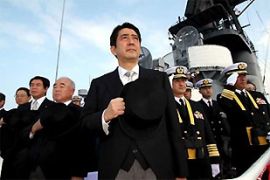Japan PM faces no confidence bill
Move follows scandal over rigged debates on government policy.

Officials had been posing as ordinary members of the public at the meetings to put simple questions to members of his government.
Apologising for the scandal Abe said he and four senior members of his cabinet would work for three months without pay as penance.
Abe’s education reform bill has been criticised by the opposition for requiring teachers to encourage patriotism in the classroom by teaching “love of country” and “public spirit”‘ in a bid to stem falling standards of education and discipline.
The no confidence motion is backed by the Democratic Party of Japan and three other parties, but is not expected to win backing in parliament where both houses are dominated by Abe’s ruling Liberal Democratic Party (LDP).
Nuclear reaction
Meanwhile Abe’s foreign minister, Taro Aso, has also been targeted with a separate no confidence motion in Japan’s lower house of parliament.
Aso has angered opposition politicians, and some members of his own Liberal Democratic Party, by suggesting Japan should hold debate building a nuclear arsenal.
Last month Aso told members of a parliamentary committee that Japan was capable of building a nuclear weapon but had no plans to do so.
Nonetheless he said Japan’s so-called pacifist constitution did not prevent the country from building nuclear weapons for defensive purposes.
His comments came in the wake of North Korea’s test of its first nuclear weapons on October 19.
Sliding popularity
The scandal and the no confidence motions come amid sliding popularity polls for Abe’s government which only came to power in September.
At the time his public support stood at around 70 per cent.
But in a poll released earlier this week, conducted before the scandal over the public hearings emerged, that had slumped to 42 per cent.
Voters have expressed worries over Abe’s handling of the economy and his approach to foreign policy, particularly in the wake of North Korea’s test.